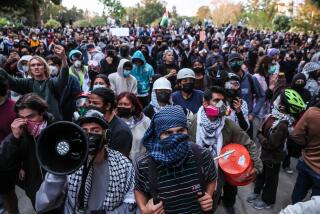Prosecutions of Protesters Clog San Francisco Courts
- Share via
SAN FRANCISCO — Mass court hearings were held Thursday for dozens of demonstrators as authorities began the task of prosecuting more than 1,500 people arrested last month in widely disruptive anti-war protests.
Officials have taken unusual steps to streamline procedures to cope with a flood of court cases not seen--even in this dissent-minded city--since the campus protests of the late 1960s.
On Thursday, 90 people appeared for arraignment in San Francisco Municipal Court, most of them charged with blocking streets, sidewalks and bridges. But only 28 of them pleaded guilty or no contest or had their cases delayed. The other 62 pleaded not guilty and asserted their right to a non-jury trial within 45 days.
The impending strain on the criminal justice system has forced authorities to adopt special procedures to speed the proceedings and even consider the use of an auditorium, if necessary, to conduct mass trials.
Meanwhile, scores of attorneys have volunteered to work with the National Lawyers Guild in providing protesters with free legal advice. Hundreds of arrestees have attended counseling sessions, learning their rights and what to expect in court.
On the other side, a number of private attorneys have volunteered to help as special prosecutors for the district attorney’s office.
The massive prosecutions contrast sharply with some instances in the past in which large numbers of protesters have been arrested but then escaped unscathed as charges were dropped. Three years ago, for example, lack of evidence forced the dismissal of charges against 443 people arrested at a protest over U.S. policy in Central America.
Now, authorities believe they have better-documented evidence--such as videotapes of the blocking of streets or access to buildings--to support their cases against the protesters. This time around, prosecutors say, demonstrators should not expect many dismissals.
“People have a right to protest and police have been very solicitous of that right,” San Francisco Dist. Atty. Arlo E. Smith said Thursday. “But we also are going to protect the right of other people to do their jobs or go to the doctor or otherwise conduct their business. We give protesters a lot of leeway here, but that doesn’t mean they’re allowed to go out and block the Bay Bridge.”
Lawyers assisting the protesters deny that in refusing to plead guilty the demonstrators are trying to strain the courts to the breaking point. They contend that many people were innocently swept up by overzealous police and are entitled to trial to plead their cases.
“The goal of the demonstrators is not to interrupt the judicial system but to stop the war,” said attorney Diana Bullock after Thursday’s mass arraignments. “Many people who were arrested were nonviolently exercising their First Amendment rights.”
Some backers of the protesters say they believe the wave of arrests resulted from an overreaction by authorities to criticism that they had not acted vigorously enough when, as the Gulf War first broke out, demonstrators briefly closed streets, bridges and buildings with relatively few being taken into custody.
“There seems to have been political pressure to act,” said Riva Enteen, demonstrations coordinator for the lawyers guild. “There was a feeling that (the police) needed to take the city back.”
The wave of prosecutions stems from the estimated 1,500 arrests--more than 1,000 on one day--made at the federal building, the financial district, the San Francisco-Oakland Bay Bridge and other locations. While a few were charged with misdemeanors, the overwhelming majority were charged with infractions, punishable by fines of from $50 to $500 or community service. Persons so charged are entitled to trial, but not a jury trial, and receive no free, court-appointed counsel.
In recent days, prosecutors, defense attorneys and court staff members have met to prepare for the proceedings with Municipal Judge Anne Bouliane, who will preside over most of the arraignments.
Over the next few weeks, large numbers of protesters are scheduled to appear in court almost daily.
More to Read
Sign up for Essential California
The most important California stories and recommendations in your inbox every morning.
You may occasionally receive promotional content from the Los Angeles Times.










